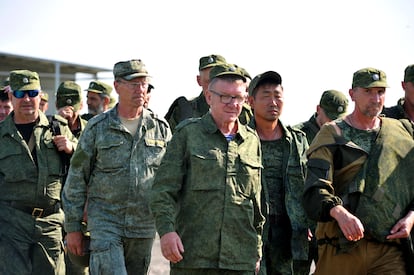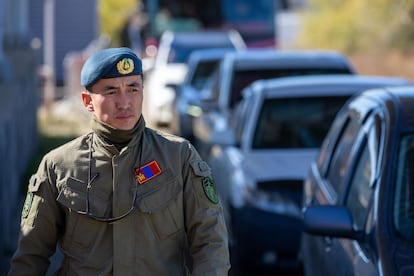Putin’s conscription drive targets Russia’s ethnic minorities
After decades of persecution, Tatars, Buryats, Tuvans and other minorities are being called up in droves to be sent to the front lines as ‘cannon fodder,’ according to NGOs and officials

Slavs only. These two words, posted on many advertisements for apartment rentals in Moscow, show the institutional racism to which many ethnic minorities in Russia are subjected. It is however a segregationist requirement that has not made its way on to any of the mobilization orders for Russians to fight in Ukraine. Ethnic minorities have provided a primary source for Vladimir Putin’s partial mobilization order – some of them have been compensated with a sheep for the recruit’s family – which has reopened wounds in a country where memories of the North Caucasus insurgency and the Chechen Wars remain fresh.
There are 461,000 Buryats in Russia, making up just 0.3% of the total population of the country. “Their conscription, like that of the Yakuts and Dagestanis, has been disproportionate in comparison to other peoples,” says the president of the Free Buryatia Foundation, Alexandra Garmayapova, in a telephone interview. Garmayapova describes mass conscription in Buryatia, where in some cases Russian recruiters have arrived on the doorsteps of acquaintances at 4am and a close relative was put on military transport after stopping at a gas station. “The family had to go and pick up the car,” she recalls. According to a 2010 census, the most recent that includes Russia’s ethnic groups, these represent around 20% of the country’s population of 144 million. Tartars, at 3.8%, and Ukrainians at 2% are the most numerous.
In Ulan-Ude, the capital of the Republic of Buryatia, a local government official who for years was a member of United Russia, the majority party in the Duma of which Vladimir Putin is de facto leader, says that the recruitment drive in this area of eastern Siberia is falling almost entirely on Buryats and not on the Slavs that live there. “I don’t know if they plan to wipe us out like this,” he says nervously. “My son is not eligible because of his age, but they have called up two of my nephews, neither of whom have any real military experience,” adds the official, who preferred to remain anonymous.
One of his friends, his wife and their three children decided to pack what they could in their car and flee to Mongolia as soon as the mobilization was announced. “And it is even worse in the villages. Even so, there is little opposition to going to Ukraine there. A lot of people don’t how things really are,” says the official. Buryatia is one of the poorest regions in Russia, and yet it has also been a huge military breadbasket for the war in Ukraine, even before the mobilization.
A sheep in exchange for a soldier
In the Republic of Tuva in the south of Russia, where Putin’s Minister of Defense Sergei Shoigu comes from, families of conscripts have received a sheep or coal in exchange for their husbands, brothers and sons. “The most important thing is support for their loved ones,” the governor of Tuva stated on Telegram.
Ethnic Buryats played a prominent role in the Donbas insurgency in 2014 and 2015, when the Kremlin sent troops to Ukraine in secret to consolidate what it wanted to portray as a pro-Russian separatist movement in the regions of Donetsk and Luhansk. “In 2014, Buryatia was one of the regions that suffered the greatest number of losses,” says Garmayapova, who believes that a lack of opportunity at home has historically been one of the main reasons for their mass conscription. The burnt face of a Buryat tankman, called Doryi Batomunkuyev, published in the Russian newspaper Nóvaya Gazeta, became one of the enduring images of that conflict.
“The question is what kind of state has Vladimir Putin constructed in which people are forced to enlist to eke out a living,” says Garmayapova. “In Buryatia you can only find work if you have a patron. If you don’t, the only alternative is military service, and Russia didn’t seem to be in a large-scale war with anyone. What other option do they have? They can emigrate to the north of Russia and find temporary jobs in mining, or try their luck in Moscow or Saint Petersburg, where they are faced with racism.”

The Free Buryatia Foundation asked its subscribers to recount their experiences of racism: “In just a couple of weeks we received more than 2,000 stories of this kind and I ended up losing count after 4,000. The Slavs hold grudges against other ethnicities who talk badly and with an accent. They also characterize them negatively. On public transportation, they call them chúrki [a racist slur] or ‘black asses.’ And only Slavs can rent apartments. There are many of those stereotypes that if you’re a guy from the Caucasus, you should work as a security guard,” says Garmayapova, who also condemns institutional racism. “As soon as the war crimes came to light, it was said that they must have been committed by savages from the national periphery because a Russian soldier would never behave like that.”
Garmayapova also points out that the Kremlin’s argument of Russians being persecuted in Ukraine “does not stand up” because of Putin’s own policies on linguistics: in 2018, the Russian president signed a decree that for the first time in history permitted the vetoing of regional dialects in schools.
In contrast to the European Union, Mongolia has already begun to expedite residency permits for Russians fleeing the draft. Tsakhiagiin Elbegdorj, a former president and prime minister of Mongolia, has opened the doors particularly to Buryats, Tuvans and Kalmyks. “I am aware that from the very outset of this bloody war, ethnic minorities in Russia have suffered the most. They are being used as cannon fodder. Hundreds have disappeared and thousands have been killed,” Elbegdorj said in a statement through the Mongol World Federation.
The Tatars and the Geneva Convention
Crimean Tatars, who have for years faced repression in the peninsula illegally annexed by Putin in 2014, now denounce that they are now a primary focus of the mobilization. Human rights organization CrimeaSOS estimates that an “enormous percentage” of conscripts in the region are Tatars, whereas they represent only about 15% of the population.
Tamila Tasheva, the NGO’s founder and permanent representative of the Ukrainian president in Crimea, attests that CrimeaSOS has counted at least 1,500 conscripts among Tatars when the total number of people called up in the region by the Russian military stands at around 3,000. “Throughout the entire occupation they have pushed us to leave our historical homeland through their repressive policies; they have persecuted us and imprisoned us for being Tatars, they have treated us like terrorists and now comes conscription,” says a Tatar in Crimea via telephone. He has decided to stay and persevere, but recounts that many of his acquaintances have had to leave after finding out, through leaked conscription lists, that they had been called to the front lines by the Russian military.
Tasheva explains how the Russian conscription has cast its net in places where Tatars gather, in their markets, with papers already drawn up. “They detain people who are of military age, they ask their names and write them down on the document, then tell them they have to go to the recruitment office,” she says. “It’s a tragedy. Either they send them off to be killed or they force them to leave.”
Mustafa Djemilev, a Ukrainian parliamentarian and a Tatar leader in Crimea, has stated that Moscow’s conscription drive seeks not only to provide cannon fodder for the Ukraine war but to remove them from their homeland, either by sending them to the front or forcing them to flee overseas, with the aim of ridding the Kremlin of a potentially troublesome population. The Ukrainian authorities have also underlined that Russia’s conscription in annexed territories, from Donbas to Crimea, is illegal. Article 51 of the Geneva Convention states: “The occupying power may not force protected persons to serve in its armed or auxiliary forces. Any pressure or propaganda for voluntary enlistment is prohibited.”
Protests in the Caucasus
Putin’s forced mobilization has provoked considerably larger protests in the provinces than in Moscow, where there was only one significant demonstration on the day the decree was announced, September 21. In Dagestan, the scenes were very different as the entire village of Endirey, with a population of over 7,000, cut off access roads after recruiters called up 110 of its inhabitants. Wives, parents and sisters even defied the conscription order when shots were fired into the air to disperse the crowds.
There were similar scenes in the northeast of the country in Yakutsk, in the Sakha Republic, where a group of dozens of women formed a circle around the police and chanted “no to genocide.” Elsewhere, the military commissioner of the Khabarovsk province on the border with China was removed from his post after half the conscripts called up were subsequently sent home for not meeting the criteria to be sent to Ukraine.
Tu suscripción se está usando en otro dispositivo
¿Quieres añadir otro usuario a tu suscripción?
Si continúas leyendo en este dispositivo, no se podrá leer en el otro.
FlechaTu suscripción se está usando en otro dispositivo y solo puedes acceder a EL PAÍS desde un dispositivo a la vez.
Si quieres compartir tu cuenta, cambia tu suscripción a la modalidad Premium, así podrás añadir otro usuario. Cada uno accederá con su propia cuenta de email, lo que os permitirá personalizar vuestra experiencia en EL PAÍS.
¿Tienes una suscripción de empresa? Accede aquí para contratar más cuentas.
En el caso de no saber quién está usando tu cuenta, te recomendamos cambiar tu contraseña aquí.
Si decides continuar compartiendo tu cuenta, este mensaje se mostrará en tu dispositivo y en el de la otra persona que está usando tu cuenta de forma indefinida, afectando a tu experiencia de lectura. Puedes consultar aquí los términos y condiciones de la suscripción digital.








































